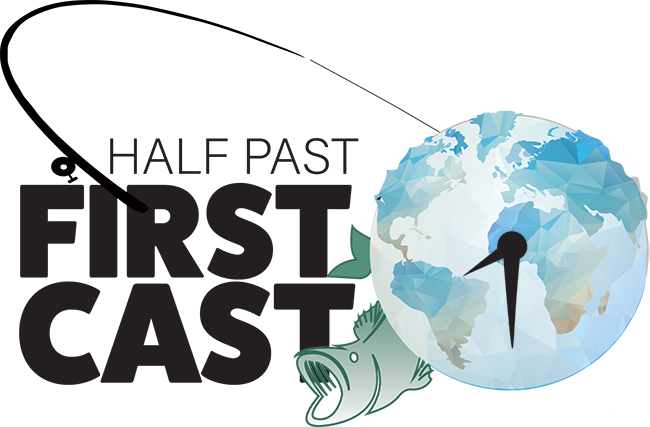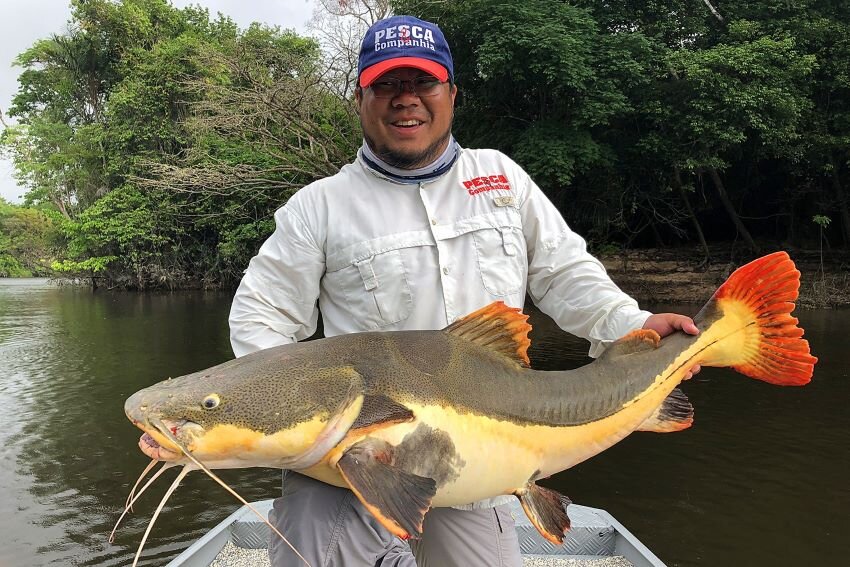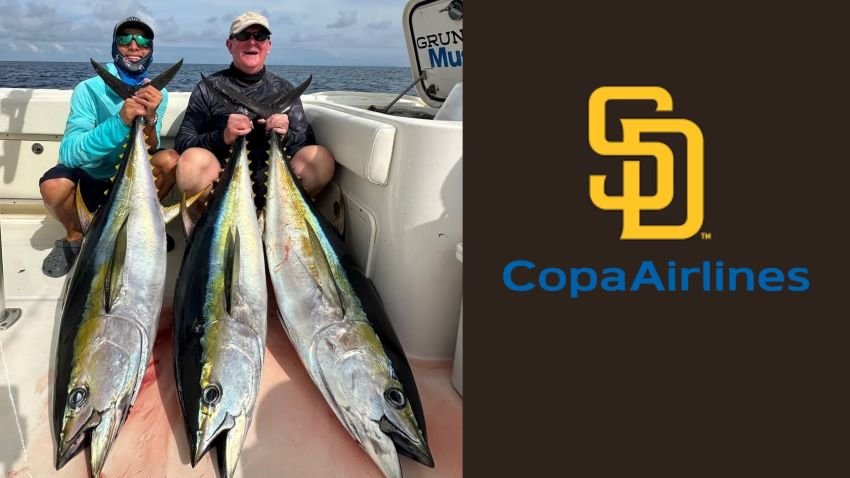Four Amazing Brazilian Fishing Destinations Everyone Should Know
[We are fortunate today to have a guest post from one of the leading fishing writers in South America, Brazil’s Alex Koike, who we profiled earlier on this website. We’re like most North American anglers who’ve only heard of a small slice of Brazil’s fisheries, but today Alex tells us about four more that we’re anxious to visit. We truly appreciate his expertise and his generous contribution.]
When we talk about fishing tourism in Brazil, most anglers from outside the country soon envision the tucunaré-açu (Amazon peacock bass), a spectacular fish, able to generate merciless attacks on our surface lures, very strong and also extraordinarily beautiful.
However, fishing in Brazil is much more varied than that. There are numerous other places to visit and other fantastic species of fish to chase. Several of these fisheries are in practically untouched places, where you can appreciate all the beauty of nature and get a sense of what it is like to fish where few human beings have ever stepped.
So, friend, travel with us on this reading and get ready to schedule your fishing in 2021.
Pantanal
I couldn't start this list with any other destination. The Pantanal is the most famous and most visited fishing spot by Brazilians.
More than 320 species of fishes, 650 birds, 120 mammals and almost 200 of reptiles live in this region. That makes it a draw even for non-angler -- it is considered a paradise for observers and photographers of fauna and flora.
In a simple walk it is possible to see large birds like the tuiuiú, the symbol of the region, as well as capybaras, alligators, and with a little luck groups of monkeys and even the jaguar - the third largest feline in the world. Because of this credible diversity, the Pantanal is recognized by UNESCO as a World Heritage Site.
There is incredible diversity for the angler as well. The most desired is the Golden Dorado, referred to here in Brazil as the "King of the River." It is a strong, beautiful, large scale predator that inhabits the rapids. The average size is from 8 to 12 pounds, but it is not uncommon to catch 16 to 18 pound specimens.
Additionally, the area offers large catfish such as jaú (40 to 80 pounds), pintado and cachara (10 to 16 pounds). Finally, another incredible fish is the pacu, an omnivorous species which has a rounded body and is very strong.
To enjoy all of the varied nature and wildlife, it is common to stay in hotel boats. The advantage of this type of accommodation is that the tourist wakes up each day in a different place, and thus gets to know all the local beauties better. You can fish a new distant fishing spot every day.
The hotel boat leaves the city of Corumbá, in Mato Grosso do Sul. It has a swimming pool, games room, fitness center, restaurant and bar. The entire internal area of the boat is air conditioned, has rooms with balconies, as well as cabins for passengers with physical disabilities or reduced mobility.
The gastronomy is of high quality and based on local culture, with piranha broth, pacu ribs, pintado roast, barbecue, and other Brazilian delicacies.
Where: The Pantanal is in the south of Mato Grosso and in the northwest of Mato Grosso do Sul. The Kayaman hotel boat departs from Corumbá (MS).
Hotel boat: Joice Pesca Tur
Serra do Cachimbo
What is your fishing motivation? To experience new and wild places? Catch many fish, big ones, or both? If all of those things are on your checklist, then Serra do Cachimbo is the right place.
In the north of Mato Grosso, we find the Rio Braço Norte, which has a large flooded area, with various types of structures that form a green labyrinth. There is the home of the trairões, an animal with a nasty face and prehistoric appearance. These beasts do not accept provocations and give a real show when hooked.
The region offers so many dinosaur-like fish that it earned the nickname “Jurassic Park." It is common to catch 20 to 30 trairão per day with an average weight of 6 to 10 pounds - the largest ones reach 16 to 20 pounds.
The trairão is a curious fish. Its behavior resembles that of a Great Dane. Like the huge dog, this is a fish that has no idea of its size and strength. Sometimes he attacks the bait in a subtle way, like a trout sipping a dry fly and just comes holding the lure in his mouth, like a happy dog with its bone. But when he realizes that he is trapped, he becomes enraged and uncontrollable.
They are able to jump and spin their whole body at high speeds, spitting the bait. The most spectacular experience is reserved for anglers who use surface lures like the Whopper Plopper or giant crawler baits like the Mega Pompadour. The fish attacks these offerings with an extra dose of rage.
It is possible to capture the species with several other types of lures, including long bill jerkbaits, soft lures and some models widely used for black bass such as spinnerbait and chatterbait.
The fishing spots are close to the lodge -- just navigate 50 meters and you can catch trophy trairão.
The inn was built in front of the river, mixing masonry with wood, it has a rustic touch, but is very cozy. The bedrooms, the lounge used for meals and the living area are all spacious and have high ceilings. They can comfortably host groups of up to 8 people, who are accommodated in 4 air-conditioned apartments.
The lounge also has a barbecue and television, to make for a festive social situation. They offer laundry service which helps to reduce the amount of clothes you need to bring.
The food is very tasty with Brazilian barbecue, fish and other regional delicacies on the menu.
Finally, another key detail is the fact that there are few of those pesky mosquitoes that are common in some other regions of Brazil.
Depending on the time of year, it is also possible to catch tucunaré, matrinxã and bicudas.
Where: North of Mato Grosso
Peixe
Located in the south of Tocantins, this small town has a very curious history about how it earned its name. The story tells us that in an abnormal year the level of the Tocantins River rose a lot, reaching a large lagoon close to the village. When the water level dropped, a huge fish was trapped in the pond. When people referred to the place or said they were going to visit the place, they said "I'm going to the city of fish," giving the city name of Peixe – which in Portuguese means fish.
The visiting angler has two options. The most desirable is the Lago do Peixe, which is in a protected region. The fauna and flora of the place hold very pleasant surprises for fishermen, and it is common to be rewarded with beautiful images. The reservoir offers warm crystalline and is full of the distinctive tucunaré-azul (blue peacock bass). In fact, it produced the world record for the species - a 4.99 kg (11 lb) and 64 cm specimen.
The blue peacock bass is one of the favorite fish of Brazilian anglers. They don’t grow quite as large as the tucunaré-açu, but it is a fish of great intense which conducts a voracious fight.
The average size can vary between 30 cm to 50 cm and 2 to 6 pounds and the large specimens measure about 60 cm. Those larger specimens are hooked with good frequency and specimens up to about 69 cm have been caught.
This animal's predatory instinct is incredible. When they are hunting, peacocks can join together in an attempt to surround a school of fish, trapping them. It often resembles the behavior of marine species, like the way bluefish blitz, attacking from all sides.
Another good option is fishing on the Tocantins River, the second largest river entirely in Brazil. Fishing starts at one of the city's ramps. At that moment, the angler can immediately see the river’s beauty, but as soon as navigation begins, you will be stunned by beautiful landscapes, especially by the islands and islets. Altogether, there are 366 islands that form the archipelago called Tropeço, the third largest river archipelago in the world.
The crystal clear, rapid-filled waters are loaded with tucunaré, cachorra (payara), bicuda -- fish that resembles the shape of the barracuda -- the apapá - which is similar to the shad, but has a golden color and reaches more than 14 pounds, and the pirapitinga – round-shaped fish which are very strong, similar to pacu.
To enjoy fishing in the region, the best option is Pousada Angical. It is a simple inn, but it has 15 spacious and apartments equipped with air conditioning. It is a perfect place to restore your strength and achieve some deserved rest after a day of fishing. Access to wi-fi is free and the signal is strong throughout the inn. It is an all-inclusive experience, with unlimited drinks and plentiful meals. They also serve varied snacks to accompany cold beer before meals.
Where: Peixe – TO
Inn: Pousada Angical
Apuí
The fact that this option is listed last should not be construed to indicate that it’s any less incredible or important than the others. Our final amazing fishery is the Ecolodge da Barra floating inn, which is located on the border between the states of Amazonas, Mato Grosso and Pará, at the confluence of the Teles Pires and Juruena rivers, where the Tapajós forms, in the south of the Amazon.
This area offers at least 20 sportfish species. Simply put, it’s one of the most fishy regions of Brazil.
The fishing season begins when the river level begins to drop. The water that flooded the forest reveals the bank and fishing spots, in addition to creating lakes and streams. The fish begin to concentrate in these places because of the abundance of food.
The fast bicudas, the impressive cachorras (payaras), exotic arowana, in addition to the peacocks, take advantage of this banquet.
When the water level drops further, huge flats appear, allowing the capture of several species by sight fishing. Catching the fish by watching its reactions is extremely exciting, an ideal situation for fly fishing.
In the pools it is possible to find giant catfish such as pirarara, jaú and piraíba - the largest catfsh fish in the Americas, reaching more than two meters and over 200 pounds.
The Ecolodge is the first floating and mobile lodge in Brazil. It was an initiative of a group of sport fishing enthusiasts who came together to offer the best fishing infrastructure in South America with the concept of sustainability. Just to give you an idea of their commitment, the project has a water treatment system that returns water to the river with 90% purity.
The inn also has an agreement with a local community, which provides part of the food, such as vegetables, used in the restaurant.
The Ecolodge has spacious apartments with air conditioning, a balcony and a pressurized shower with hot water. One of the highlights is the daily laundry service.
The restaurant is air-conditioned and overlooked the river. The menu includes delicious traditional and regional foods. The large balcony has benches and rod supports to accommodate your fishing tackle.
Where: Apuí (AM)
Inn: Ecolodge da Barra











